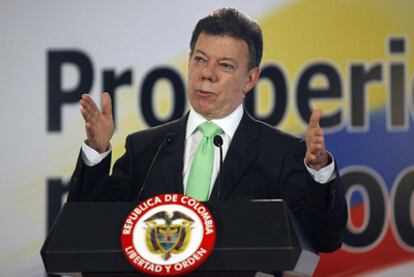Colombia tackles its biggest problem
Corruption reported to be more harmful than drug trafficking and violence
Andrés Felipe Arias was until recently one of Colombia's most promising young politicians. He was only 31 when he became minister of agriculture in 2005, and in that position became the right-hand man of former President Álvaro Uribe, who once said Arias was his "improved copy." At the peak of his popularity, Arias ran for the Conservative Party presidential nomination in the 2010 elections. He lost, but received more than one million votes, which was seen as a victory for a man many considered Uribe's successor.
But in the last few days, Arias has been in the spotlight for an entirely different reason. On July 19, the country's Solicitor General disqualified him from holding public office for the next 16 years for "very serious disciplinary irregularities" during his flagship program as agriculture minister, called Agro Ingreso Seguro . The program, which was set up to provide farmers with subsidies, handed instead some 2.7 million eurosto wealthy families and public figures. Then, late on July 26, a judge in Bogotá ordered his arrest while his trial proceeds.
Since 1998, 30 major corruption scandals have been uncovered in Colombia
This scandal is not an isolated incident. In recent months, Colombians have witnessed one corruption story after another, to the point that in May, Public Prosecutor Viviane Morales said in an interview for the Bogotá daily El Tiempo that corruption has become more harmful than drug trafficking and violence, Colombia's two historical problems. "There is a structural crisis in the country, because corruption crimes exceeded our capabilities," she argued.
This statement was followed in June by a new strategy presented by President Juan Manuel Santos to comprehensively fight graft. It sets out to increase transparency in public procurement and the financing of political campaigns - two areas that have been at the core of recent wrongdoings - and to give additional powers to regulatory bodies so that they can uncover unsavory schemes in the country's administration. And it has worked.
In what was defined by the local news magazine Semana as "the government vs. the government," Santos and his team revealed corrupt practices in the country's health system and in the Tax and Customs Office. Both cases involved "mafias" that had put in place elaborate schemes to divert millions of pesos from public funds into private hands. Five people were arrested in the first case, and a dozen more were held as a result of the investigations into the second. Santos qualified these discoveries as "the tip of the iceberg," adding that by revealing these cases it prevented the country from losing some 400 million euros a year.
Santos' plan to publicly denounce corruption in his own government has been criticized by pundits as a "propaganda" tool but it has also been praised as a move with an "enormous potential" to tackle one of Colombia's most crippling and enduring problems.
Semana calculated that at least 30 major corruption scandals have been uncovered since 1998. They have tarnished the image of the military, public ministries, Congress, the national intelligence service DAS and even the mayor of Bogotá, Samuel Moreno, who was suspended from office in May because of irregularities in the granting of contracts for public works. In 2009, more than 48,000 officials were being investigated by the Solicitor General's office.
A recent poll revealed that 70 percent of Colombians believe corruption is getting worse, but they also praised the way in which the government is tackling it. Approval ratings have jumped from 39 to 54 percent.

Tu suscripción se está usando en otro dispositivo
¿Quieres añadir otro usuario a tu suscripción?
Si continúas leyendo en este dispositivo, no se podrá leer en el otro.
FlechaTu suscripción se está usando en otro dispositivo y solo puedes acceder a EL PAÍS desde un dispositivo a la vez.
Si quieres compartir tu cuenta, cambia tu suscripción a la modalidad Premium, así podrás añadir otro usuario. Cada uno accederá con su propia cuenta de email, lo que os permitirá personalizar vuestra experiencia en EL PAÍS.
¿Tienes una suscripción de empresa? Accede aquí para contratar más cuentas.
En el caso de no saber quién está usando tu cuenta, te recomendamos cambiar tu contraseña aquí.
Si decides continuar compartiendo tu cuenta, este mensaje se mostrará en tu dispositivo y en el de la otra persona que está usando tu cuenta de forma indefinida, afectando a tu experiencia de lectura. Puedes consultar aquí los términos y condiciones de la suscripción digital.








































